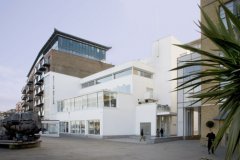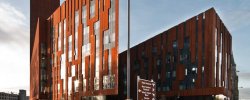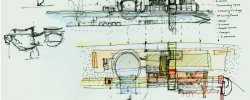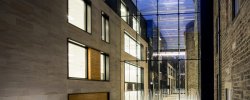Architecture courses London
 Architect Deborah Saunt, co-founder of DSDHA, and Clive Sall, one of the founders of the now-defunct studio FAT, will be the course leaders.
Architect Deborah Saunt, co-founder of DSDHA, and Clive Sall, one of the founders of the now-defunct studio FAT, will be the course leaders.
Tutors will include Tom Holbrook, founder of Cambridge firm 5th Studio and a studio leader at the University of Cambridge Department of Architecture, James Soane, co-founder of London interior design studio Project Orange, and writer and critic Alan Powers.
"We agree that the role of the architect is not just to serve the world, but to question it, " said Hunter. "The world is changing rapidly in so many areas, and the school has been established to explore the spatial consequences of that."
Read the edited transcript from our interview with Will Hunter:
Anna Winston: Why did you want to launch a new school? London has plenty.
Will Hunter: I started to think about a new model for architectural education in 2012 when the government raised the tuition fee cap to £9, 000 per year.
The head of SCHOSA [the Standing Conference of Heads of Schools of Architecture] Alex Wright produced this really scary graph showing the interest on tuition fee debt vastly outstripping salary increases for a typical 30-year career as an architect. "Enter the architectural profession and forever be in debt" is not a great recruitment message.
I was thinking about a different way to view education – a different kind of model for architectural education. It would bring academia and practice together so there would be a kind of financial equilibrium between the two, making a more integrated and relevant architectural culture between the students and the practices in London and creating a much more dynamic, outward-facing architectural culture.
British architects are undervaluedAnna Winston: Is it fair to say that the existing system is a bit broken?
Will Hunter: I don't want say that particularly, we just want to do something different. There are some great schools in the UK and it would be silly to say that we are the only school that's experimenting. But I think what we're doing is completely different.
Anna Winston: Can you explain why this financial situation is more of an issue for architecture than other subject areas?
Will Hunter: It's more of a problem because it is seven years' training, with five years' fees. The worrying thing is not only the high tuition fees but the low salary expectations. Today British architects are undervalued as they have been marginalised in the design and construction process and, since Thatcher's abolition of the fixed fees scales in the 1980s, have progressively undercut each other on price.
We've set up the London School of Architecture to bring academia and practice closer together in order to strengthen both. We're working with London Metropolitan and 40 practices in London, not only to seek a more accessible route into the profession, but to explore – and to shape – the future possibilities for the profession itself.
We agree that the role of the architect is not just to serve the world, but to question it. However, we want our students to combine the critique and the proposal. We don’t believe in fabricating alternative realities to design for, as we think that "real" reality is far more engaging, surprising and fascinating.
The role of the architect is not just to serve the world, but to question itAnna Winston: So how have you turned this idea into a real school?
Will Hunter: It really came from writing a piece in the AR. Lots of people got in touch and it gradually formed as a kind of collective. It went from lots of meetings around tables and discussing ideas to more of a faculty, so it's grown organically, really. After we thought of it formally as a school, in October 2013, we started going round to all the practices and pitching to them to get them involved. There's been a real organic mission.
Anna Winston: What are you hoping will be different about your students in particular?
Will Hunter: Well I think I'd like them to have a kind of maverick quality, and to be entrepreneurial and to be experimental. And proactive.
Anna Winston: Do you have a manifesto for the school?
Will Hunter: We want architectural education to be empowering and accessible, and also really relevant. The world is changing rapidly in so many areas, and the school has been established to explore the spatial consequences of that. Architecture is the only discipline able to do this, and that is what makes it so valuable and such an exciting time to be part of it.
Anna Winston: And how is the relationship with The Cass working?
Will Hunter: They're our academic partner. We're seeking validation from them, so our students would get a qualification. We're also seeking ARB accreditation, which would give the students the Part II. But that's a separate process. The London Met process gives the students an academic award so they could go on and do their PhD if they wanted to.
You need a certain amount of people for critical mass, but we want everyone to know each otherAnna Winston: But you're not seeking RIBA accreditation?
Will Hunter: We are, but you can only seek that when you have a year's worth of work. If you get ARB accreditation then that's what gives you the Part II, and then the RIBA validation is like a gold standard on top of that. It's quite complicated.
Anna Winston: Were you expecting it to be this complicated?
Will Hunter: No. I think I was probably quite naive. There's a graph that I've seen that starts with an uninformed optimist then an informed pessimist then you come out of the other side as an informed optimist. So I've been through the other side of that. I've had some really good people working on it as well, and I think people have been enthusiastic.
Anna Winston: How many people are there going to be in the first year?
Will Hunter: We're looking for about 25.
Anna Winston: So it's quite small – is that a purposeful decision?
Will Hunter: Well I think we'll always remain quite small. The maximum we'll be is 40. You need a certain amount of people for critical mass but we don't want to get too big. We want everyone to know each other.








